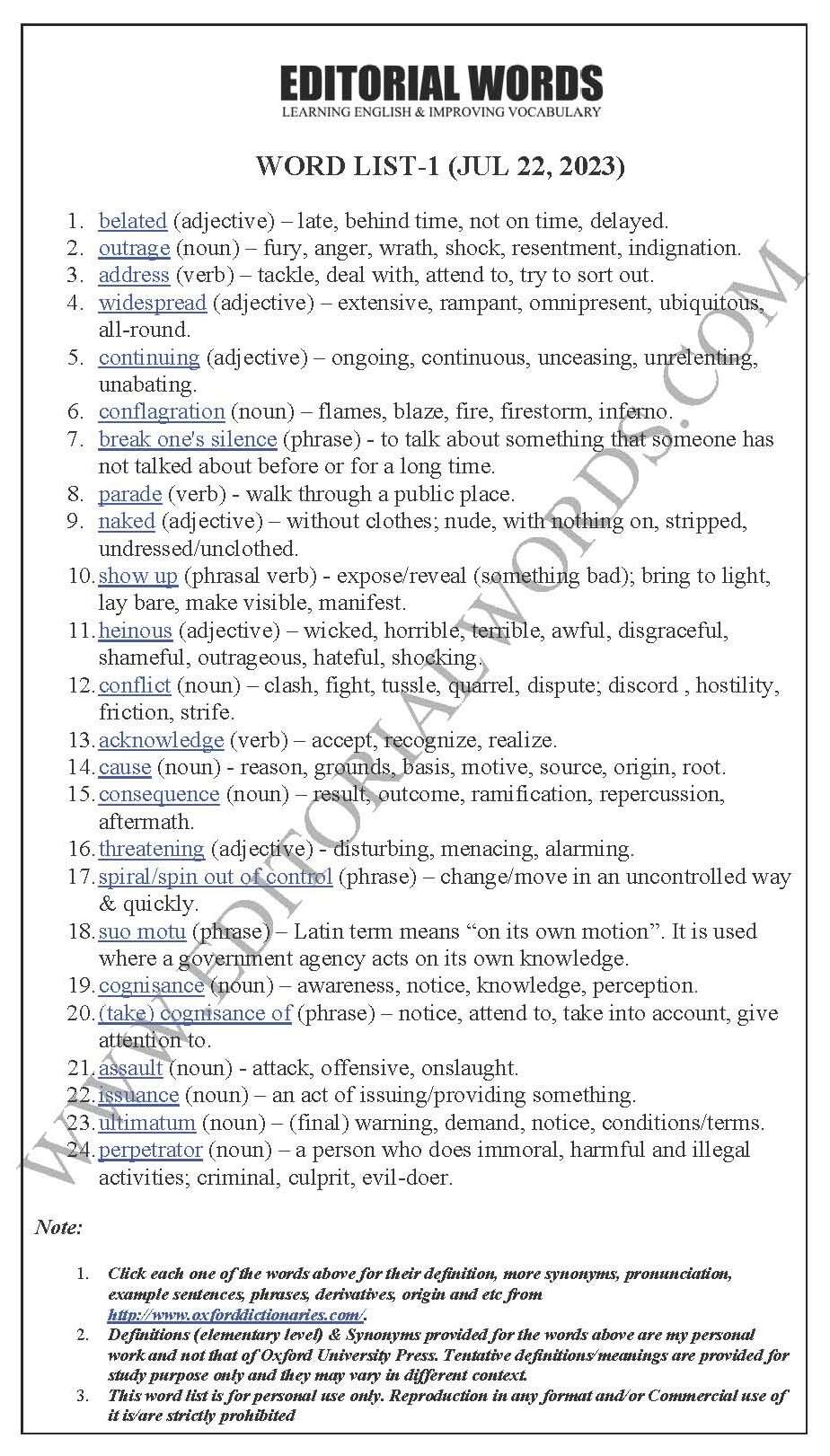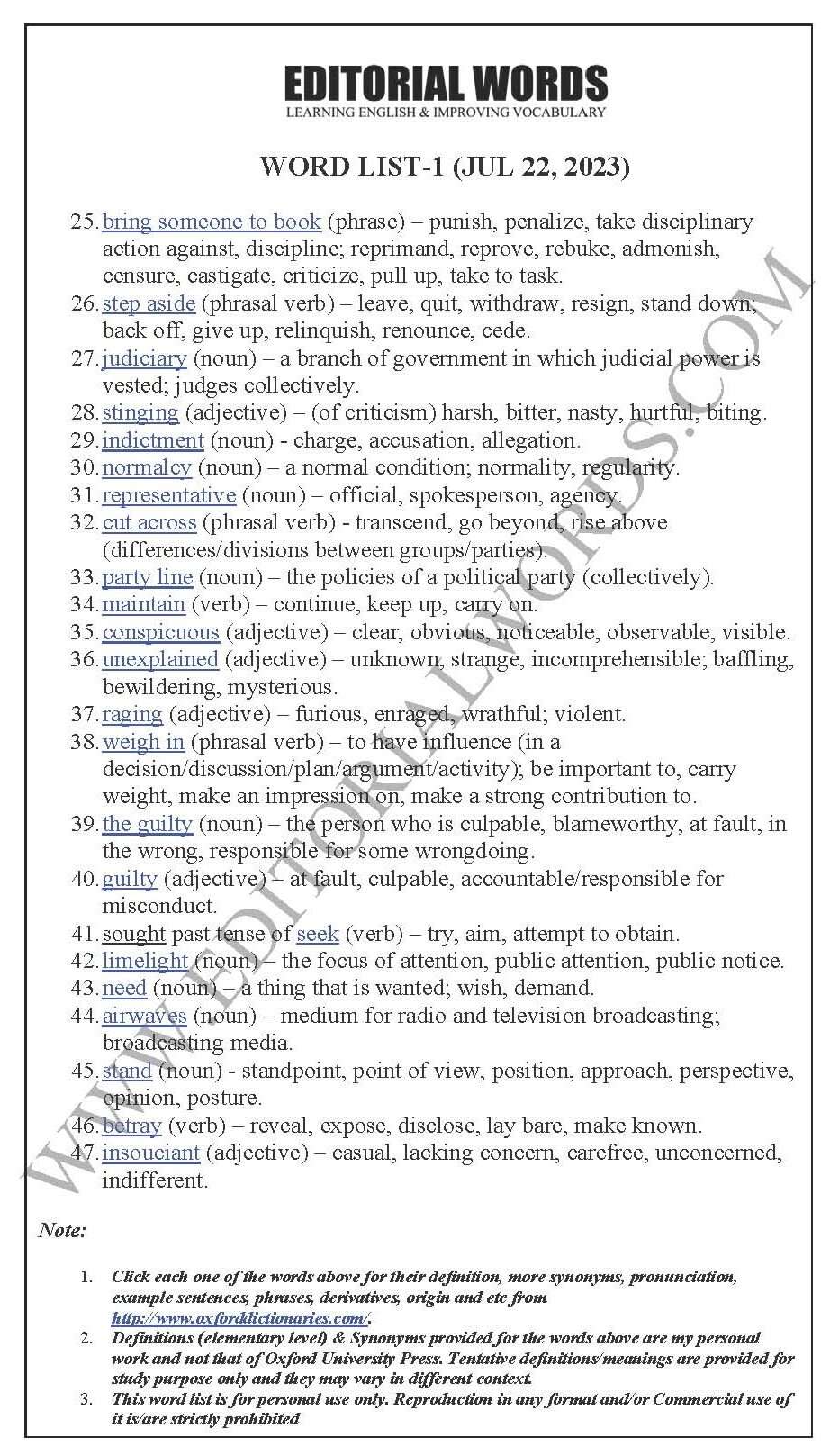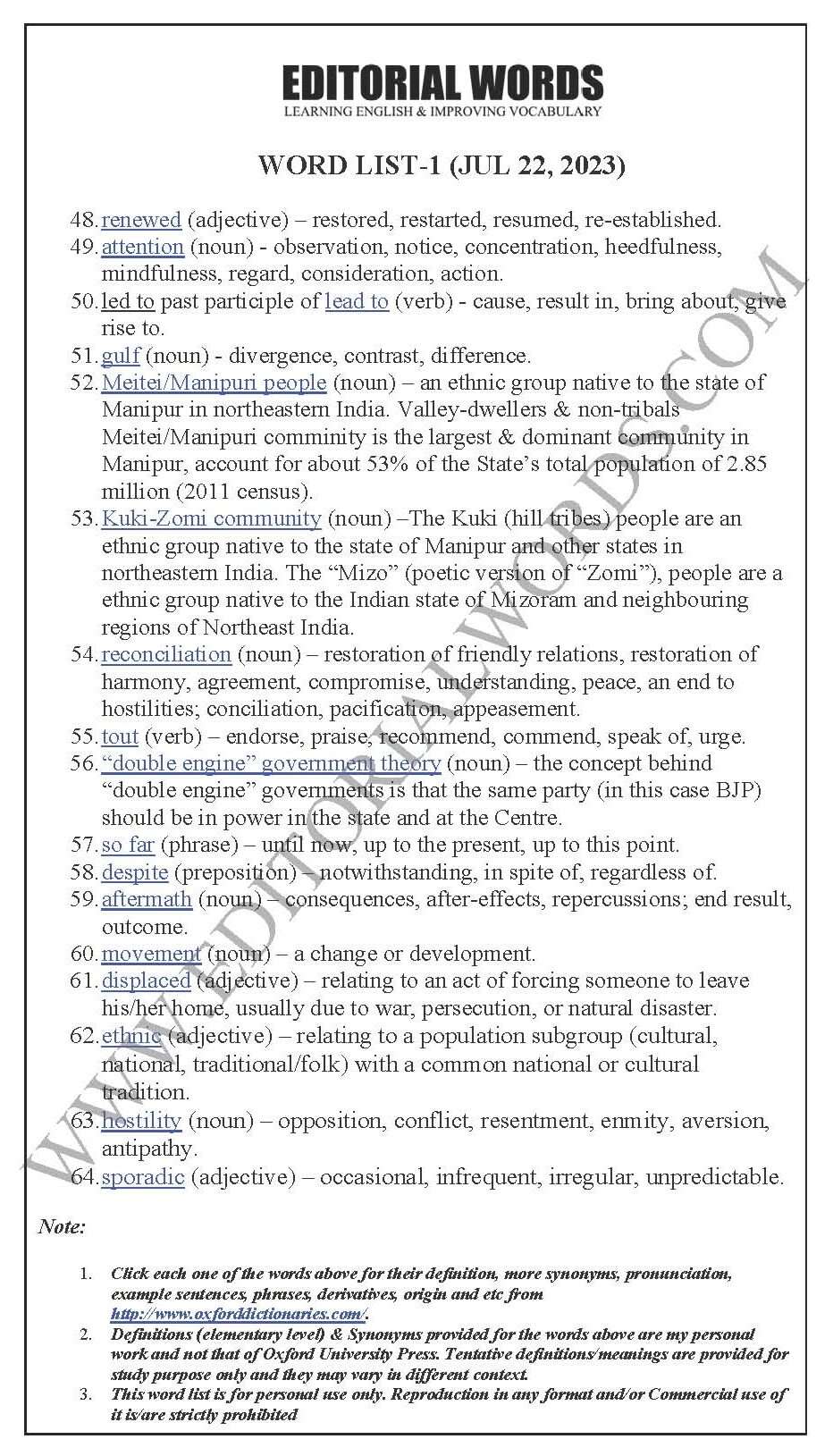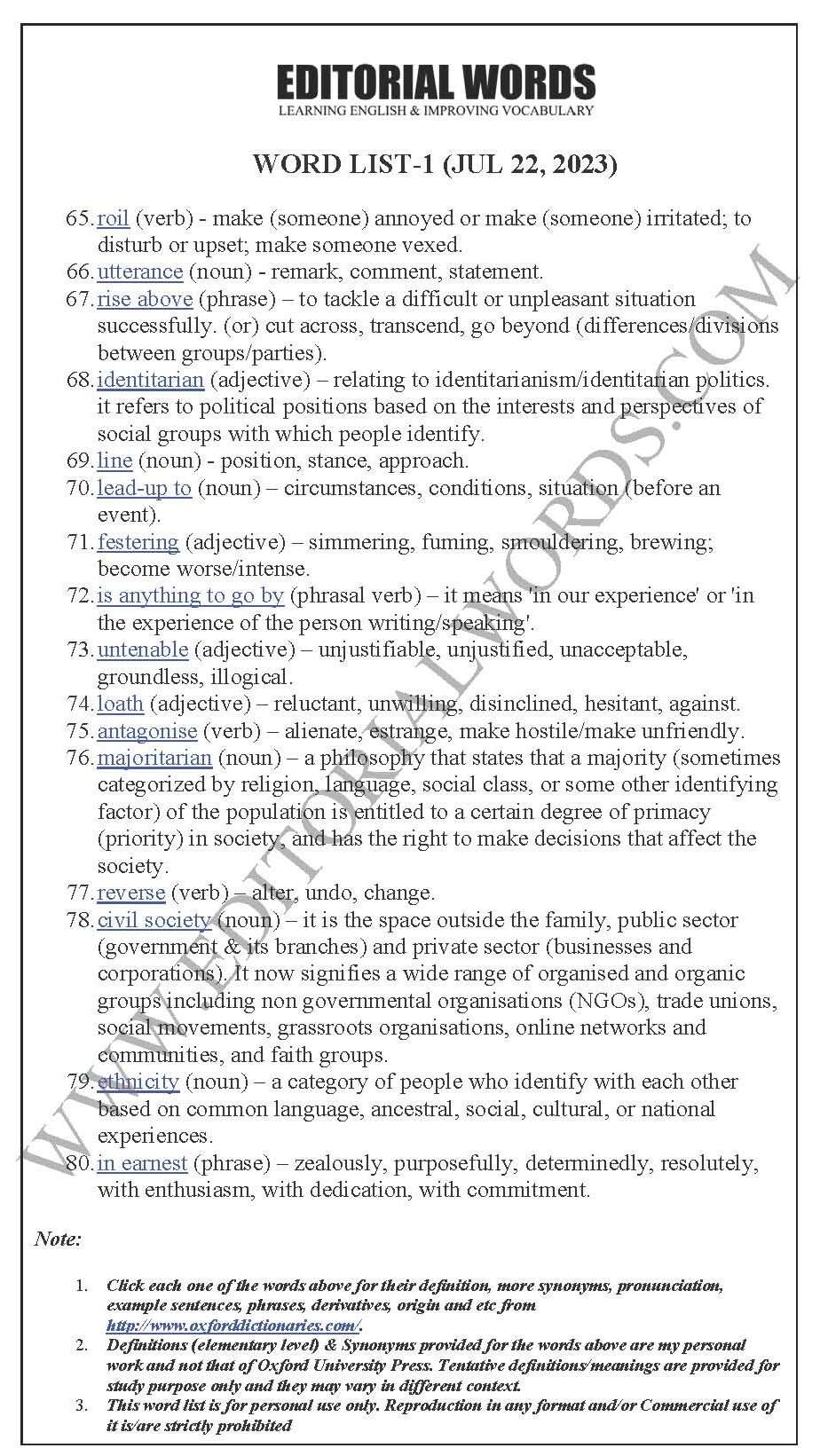The Hindu Editorial (Belated outrage) – Jul 22, 2023
To read this article, click “The Hindu”.
This preview is provided here with permission.
Courtesy: The Hindu
The Hindu Editorial (Belated outrage) – Jul 22, 2023:
- belated (adjective) – late, behind time, not on time, delayed.
- outrage (noun) – fury, anger, wrath, shock, resentment, indignation.
- address (verb) – tackle, deal with, attend to, try to sort out.
- widespread (adjective) – extensive, rampant, omnipresent, ubiquitous, all-round.
- continuing (adjective) – ongoing, continuous, unceasing, unrelenting, unabating.
- conflagration (noun) – flames, blaze, fire, firestorm, inferno.
- break one’s silence (phrase) – to talk about something that someone has not talked about before or for a long time.
- parade (verb) – walk through a public place.
- naked (adjective) – without clothes; nude, with nothing on, stripped, undressed/unclothed.
- show up (phrasal verb) – expose/reveal (something bad); bring to light, lay bare, make visible, manifest.
- heinous (adjective) – wicked, horrible, terrible, awful, disgraceful, shameful, outrageous, hateful, shocking.
- conflict (noun) – clash, fight, tussle, quarrel, dispute; discord , hostility, friction, strife.
- acknowledge (verb) – accept, recognize, realize.
- cause (noun) – reason, grounds, basis, motive, source, origin, root.
- consequence (noun) – result, outcome, ramification, repercussion, aftermath.
- threatening (adjective) – disturbing, menacing, alarming.
- spiral/spin out of control (phrase) – change/move in an uncontrolled way & quickly.
- suo motu (phrase) – Latin term means “on its own motion”. It is used where a government agency acts on its own knowledge.
- cognisance (noun) – awareness, notice, knowledge, perception.
- (take) cognisance of (phrase) – notice, attend to, take into account, give attention to.
- assault (noun) – attack, offensive, onslaught.
- issuance (noun) – an act of issuing/providing something.
- ultimatum (noun) – (final) warning, demand, notice, conditions/terms.
- perpetrator (noun) – a person who does immoral, harmful and illegal activities; criminal, culprit, evil-doer.
- bring someone to book (phrase) – punish, penalize, take disciplinary action against, discipline; reprimand, reprove, rebuke, admonish, censure, castigate, criticize, pull up, take to task.
- step aside (phrasal verb) – leave, quit, withdraw, resign, stand down; back off, give up, relinquish, renounce, cede.
- judiciary (noun) – a branch of government in which judicial power is vested; judges collectively.
- stinging (adjective) – (of criticism) harsh, bitter, nasty, hurtful, biting.
- indictment (noun) – charge, accusation, allegation.
- normalcy (noun) – a normal condition; normality, regularity.
- representative (noun) – official, spokesperson, agency.
- cut across (phrasal verb) – transcend, go beyond, rise above (differences/divisions between groups/parties).
- party line (noun) – the policies of a political party (collectively).
- maintain (verb) – continue, keep up, carry on.
- conspicuous (adjective) – clear, obvious, noticeable, observable, visible.
- unexplained (adjective) – unknown, strange, incomprehensible; baffling, bewildering, mysterious.
- raging (adjective) – furious, enraged, wrathful; violent.
- weigh in (phrasal verb) – to have influence (in a decision/discussion/plan/argument/activity); be important to, carry weight, make an impression on, make a strong contribution to.
- the guilty (noun) – the person who is culpable, blameworthy, at fault, in the wrong, responsible for some wrongdoing.
- guilty (adjective) – at fault, culpable, accountable/responsible for misconduct.
- sought past tense of seek (verb) – try, aim, attempt to obtain.
- limelight (noun) – the focus of attention, public attention, public notice.
- need (noun) – a thing that is wanted; wish, demand.
- airwaves (noun) – medium for radio and television broadcasting; broadcasting media.
- stand (noun) – standpoint, point of view, position, approach, perspective, opinion, posture.
- betray (verb) – reveal, expose, disclose, lay bare, make known.
- insouciant (adjective) – casual, lacking concern, carefree, unconcerned, indifferent.
- renewed (adjective) – restored, restarted, resumed, re-established.
- attention (noun) – observation, notice, concentration, heedfulness, mindfulness, regard, consideration, action.
- led to past participle of lead to (verb) – cause, result in, bring about, give rise to.
- gulf (noun) – divergence, contrast, difference.
- Meitei/Manipuri people (noun) – an ethnic group native to the state of Manipur in northeastern India. Valley-dwellers & non-tribals Meitei/Manipuri comminity is the largest & dominant community in Manipur, account for about 53% of the State’s total population of 2.85 million (2011 census).
- Kuki-Zomi community (noun) –The Kuki (hill tribes) people are an ethnic group native to the state of Manipur and other states in northeastern India. The “Mizo” (poetic version of “Zomi”), people are a ethnic group native to the Indian state of Mizoram and neighbouring regions of Northeast India.
- reconciliation (noun) – restoration of friendly relations, restoration of harmony, agreement, compromise, understanding, peace, an end to hostilities; conciliation, pacification, appeasement.
- tout (verb) – endorse, praise, recommend, commend, speak of, urge.
- “double engine” government theory (noun) – the concept behind “double engine” governments is that the same party (in this case BJP) should be in power in the state and at the Centre.
- so far (phrase) – until now, up to the present, up to this point.
- despite (preposition) – notwithstanding, in spite of, regardless of.
- aftermath (noun) – consequences, after-effects, repercussions; end result, outcome.
- movement (noun) – a change or development.
- displaced (adjective) – relating to an act of forcing someone to leave his/her home, usually due to war, persecution, or natural disaster.
- ethnic (adjective) – relating to a population subgroup (cultural, national, traditional/folk) with a common national or cultural tradition.
- hostility (noun) – opposition, conflict, resentment, enmity, aversion, antipathy.
- sporadic (adjective) – occasional, infrequent, irregular, unpredictable.
- roil (verb) – make (someone) annoyed or make (someone) irritated; to disturb or upset; make someone vexed.
- utterance (noun) – remark, comment, statement.
- rise above (phrase) – to tackle a difficult or unpleasant situation successfully. (or) cut across, transcend, go beyond (differences/divisions between groups/parties).
- identitarian (adjective) – relating to identitarianism/identitarian politics. it refers to political positions based on the interests and perspectives of social groups with which people identify.
- line (noun) – position, stance, approach.
- lead-up to (noun) – circumstances, conditions, situation (before an event).
- festering (adjective) – simmering, fuming, smouldering, brewing; become worse/intense.
- is anything to go by (phrasal verb) – it means ‘in our experience’ or ‘in the experience of the person writing/speaking’.
- untenable (adjective) – unjustifiable, unjustified, unacceptable, groundless, illogical.
- loath (adjective) – reluctant, unwilling, disinclined, hesitant, against, opposed, averse.
- antagonise (verb) – alienate, estrange, make hostile/make unfriendly.
- majoritarian (noun) – a philosophy that states that a majority (sometimes categorized by religion, language, social class, or some other identifying factor) of the population is entitled to a certain degree of primacy (priority) in society, and has the right to make decisions that affect the society.
- reverse (verb) – alter, undo, change.
- civil society (noun) – it is the space outside the family, public sector (government & its branches) and private sector (businesses and corporations). It now signifies a wide range of organised and organic groups including non governmental organisations (NGOs), trade unions, social movements, grassroots organisations, online networks and communities, and faith groups.
- ethnicity (noun) – a category of people who identify with each other based on common language, ancestral, social, cultural, or national experiences.
- in earnest (phrase) – zealously, purposefully, determinedly, resolutely, with enthusiasm, with dedication, with commitment.
Note:
1. Click each one of the words above for their definition, more synonyms, pronunciation, example sentences, phrases, derivatives, origin and etc from http://www.oxforddictionaries.com/.
2. Definitions (elementary level) & Synonyms provided for the words above are my personal work and not that of Oxford University Press. Tentative definitions/meanings are provided for study purpose only and they may vary in a different context.
3. This word list is for personal use only. Reproduction in any format and/or Commercial use of it is/are strictly prohibited.
The Hindu Editorial (Belated outrage) – Jul 22, 2023:




“Phrasal Verbs” We Learnt Last Week
“Idioms & Phrases” We Learnt Last Week
“Important Definitions” We Learnt Last Week
Recent Word Lists For The Hindu Editorial Articles

After two and a half months of widespread and continuing violence in Manipur, which included a conflagration in early May,…. For further reading, visit “The Hindu”. Below is today’s word list-1 for The Hindu Editorial (Belated outrage) – Jul 22, 2023.